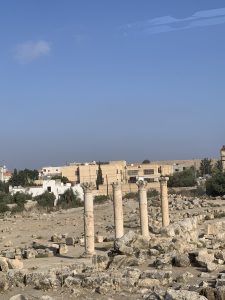On a bus from Jordan to Israel, our Jordanian guide, Mueen, shared his preference for working as a religious guide, as he found faith tourism more meaningful than other forms of tourism. He also mentioned that he was fluent in both English and German, and this led to a conversation about the Crusades. As the bus drove past the location of a Crusader castle, Mueen spoke about some European tourists who had deep contempt of the Crusade, but he attempted to explain that some Crusaders genuinely believed that their cause was just.

One of many ancient ruins in Jordan which our guide claims to have existed during the Crusades.
The Crusades were a series of wars fought between Christians and Muslims in the 11th, 12th, and 13th centuries with the aim of recapturing the Holy Land from Muslim control. The motivations and beliefs of individual Crusaders were complex and varied, shaped by religion, politics, and personal experiences. To gain a deeper understanding of these motivations and beliefs, it’s important to examine primary sources such as “The First Crusade: The Chronicle of Fulcher of Chartres” and secondary sources such as “The First Crusade and The Idea of Crusading” by Jonathan Riley-Smith.
Fulcher of Chartres was a chronicler and participant in the First Crusade, and his account provides a firsthand view of the thoughts and beliefs of individual Crusaders. He explains that the Crusade was seen as a form of pilgrimage, and many saw it as their sacred duty to defend their faith and reclaim the Holy Land. Riley-Smith, in his book, argues that the Crusades should be seen within the broader context of medieval Christianity. He explains that the Crusades represented a new form of religious devotion that combined the ideals of pilgrimage and warfare, and many Crusaders believed that their participation would bring spiritual rewards and a sense of purpose.
The motivations and beliefs of individual Crusaders were also influenced by political and social factors. Some were motivated by wealth and adventure, others by a desire for escape from their mundane lives, and others still by a desire to defend their homes and families.
The following are some of the factors that shaped the Crusades:
The Catholic Church
The Pope played a significant role in the launching of the Crusades, and the concept of Holy War was central to the Church’s theology at the time. The Church saw the Crusades as a way to reunite the Christian world and to defend the faith against Muslim aggression. The Crusades also served to increase the power and prestige of the papacy, as the Pope was seen as the spiritual leader of Christendom and the instigator of the holy wars.
The Byzantine Empire
The Byzantine Empire was a major Christian power in the eastern Mediterranean, and it was threatened by Muslim expansion. The Byzantines appealed to the West for help, and this led to the launching of the First Crusade. The Byzantine Empire played a crucial role in the Crusades, as it provided support and resources to the Crusaders, and its political and military power helped to shape the outcome of the wars.
Economic and Social Factors
The Crusades offered opportunities for wealth and adventure, as well as a chance for individuals to escape from their mundane lives and seek new opportunities. The Crusades also had a significant impact on the economy and society of Europe, as the wars led to the growth of trade, the expansion of commerce, and the development of new technologies and innovations.
The Muslim World
The Crusades represented a major threat to Muslim dominance in the eastern Mediterranean, and the wars had a profound impact on the cultural and political landscape of the region. The Crusades also led to a growing sense of Muslim unity and identity, as the wars helped to bring the diverse Muslim communities of the region together and to solidify the power of the Islamic state.
CONCLUSION
When reflecting on the accusations of the European tourists, it’s important to understand that historical context and cultural norms are different from what they are today. Judging history based on contemporary values can lead to misunderstandings and a failure to appreciate the complexities of historical events. By viewing historical events in their proper context, it’s possible to gain a deeper and more nuanced understanding of the past and the evolution of society over time.





